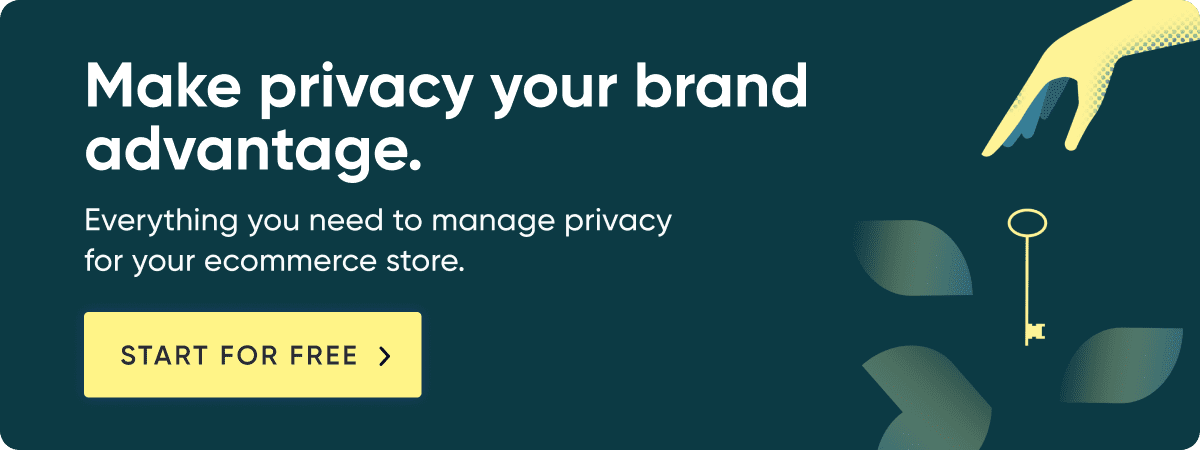How to Choose the Best Ecommerce Platform for Your Business

Table of Contents
Whether you’ve got a great new startup idea or are looking to take your business online, everyone looking to venture into the ecommerce world needs a reliable platform. Despite being strictly digital, an ecommerce platform acts as a sort of brick-and-mortar home base, the physical representation of your digital storefront. Your platform is an important part of your business, enabling and hampering your progress depending on the circumstance.
With hundreds of different platforms to choose from, all touting their amazing features, it’s tough to know which platform is right for you. We’ll review the top considerations you need to know, as well as some of the best platform options available.
Consider the Business Side
As the owner of your business, and operator of your ecommerce site, there are a myriad of things to consider when choosing the best platform for your business. Here are just a few:
Budget
The first and easiest one is budget. Simply put: how much capital can you afford to spend on your ecommerce platform, and all the expenses it may entail? Most platforms charge a monthly or yearly subscription fee for use, along with possible recurring fees for a domain name, a unique or customizable website, additional plug-ins or integrations, and much, much more. One thing to consider is whether the platform includes all the key features you need? Or will you need to add costly third-party tools and apps for your website to perform? Create a detailed budget before deciding, and have it in hand when comparing your platform options to find the right fit.
Scale
The needs of a creative selling hand-crafted jewelry and a CEO aiming for Fortune 500 are very different. The best eCommerce platforms can scale alongside your business, enabling the flexibility necessary to adjust to the moment. Still, certain platforms are better for smaller or larger businesses. Consider the nature of your business, and how important tools like plug-ins, software integration, inventory management, and data reporting are for your success.
Search Engine Optimization
If your ecommerce platform does not leverage solid search engine optimization (SEO) practices, your website is going to be seen by far fewer potential customers. Effective SEO is crucial for eCommerce businesses of all kinds, as web traffic referrals through online searches make up a vast amount of online traffic. After all, there are nearly 8.5 billion searches on Google every single day, with many of them consisting of ecommerce products. What's more, almost 34% of all searches result in a click on an organic result, compared to only 1.6% to paid results.
As such, prioritizing SEO can help your ecommerce store spend less money on advertising and lower customer acquisition costs.
Third-Party Apps and Plugins
No ecommerce platform can do everything on its own. For example, Shopify is great for building out your storefront and fulfilling orders, but does not have a native email marketing tool. That's where third-party apps can help bridge the gap: the best Shopify apps considerably enhance its capabilities and help you get more out of the platform. Yes, this usually has an additional cost but the apps more than pay for themselves when utilized properly.
Consider the Customer Side
You are only one part of the equation. The other, your potential customers, should find your site easy to use and aesthetically pleasing. Put yourself in your customer’s shoes, and consider the following:
Shopping Experience
Whichever ecommerce platform you choose, it should allow you to make a fantastic website for your customers to shop. The best ecommerce sites are intuitive from the start, creating a pleasant and quick user experience for owners and customers. Not only that, but they work perfectly, no matter what device you use. This is crucial, as, according to shopping data collected by Google, a negative mobile experience can drastically affect sales. Choose a platform that will help you build a universally effective, trustworthy site, with social proof like user reviews, social integration and more. After all, creating a trustworthy site is another surefire way to land more sales.
Checkout Experience
Choosing a platform that either has, or allows you to create your own, smooth checkout experience is another important consideration to make. According to a 2024 data report by the Baymard Institute, online shoppers abandon their cart over 70% of the time, with reasons like forced account creation or a complicated checkout process being top reasons for abandonment.
Site Speed
If your site is slow, people aren’t going to use it. A basic fact, but an important one nonetheless. Websites that load in under 4 seconds universally have the best conversion rates. This is largely up to your eCommerce platform, so be sure to pick one that is known to be speedy and reliable.
The Top Ecommerce Platform Recommendations
With all that in mind, it can still be overwhelming to compare the hundreds of ecommerce platforms out there. While there is no universal “best platform” for everyone, there are a few that stand out, and a few we’d like to showcase today:
Shopify: Best for Medium-Sized Businesses
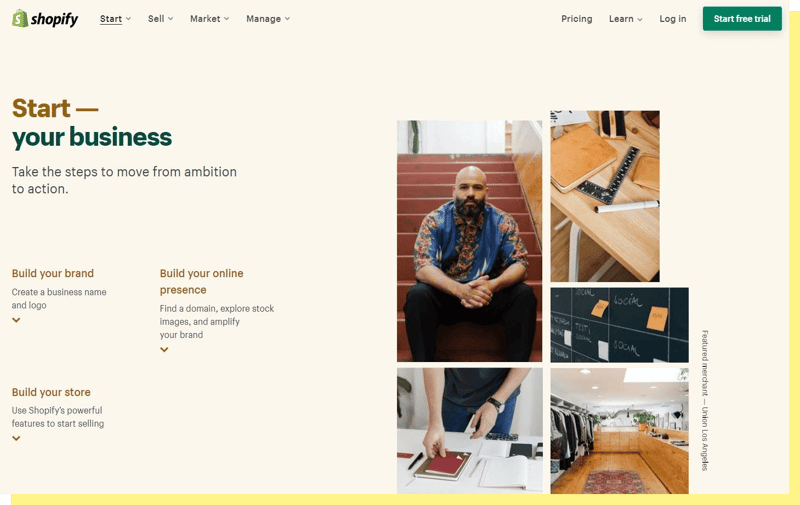
The elephant in the room. According to data by Oberlo, Shopify accounts for a whopping 28% of eCommerce market share in the United States up from 23% in 2021. Taking a look at the data year over year, Shopify revenue is skyrocketing.
We like Shopify because it manages to be easy to set up yet incredibly scalable. Shopify handles sales, payments, inventory management, and other technical tasks with little effort from business owners. The setup is painless and creates an appealing site easily. The pricing can vary, but plans should suit businesses across their growth trajectory.
But the vast integration with plugins and software puts Spotify above the competition. With the right vision and the right effort, a Shopify-powered site can be almost anything. Just check out top brands like Los Angeles Apparel or Colourpop, both powered by Shopify Plus.
What's more, Shopify is incredibly safe and secure to use, with encryption and merchant support baked into its core product.
Pros:
- Incredibly expansive plugin and software support
- Very responsive support team
- Fast user performance
Cons:
- SEO performance could be better
- Can get pricey if you rely heavily on third-party apps
👉 Check out our deeper dive into Shopify Pros and Cons.
BigCommerce: Best for Enterprise Businesses
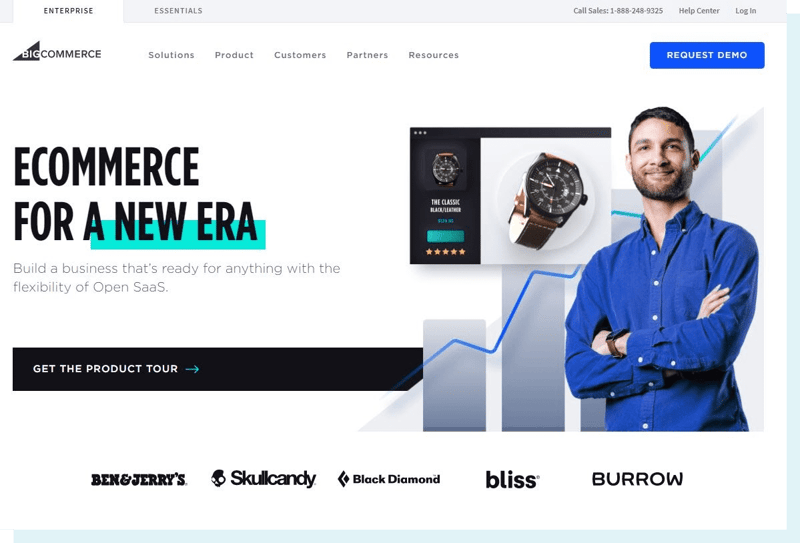
If you are already a mid-sized business, or have a very concrete, in-action operation, BigCommerce might be for you.
BigCommerce, as its name suggests, is more focused on larger business operations. A major feature it holds over the competition is payment processing, where you can choose from over 55 different options, many without extra fees tacked on. BigCommerce supports unlimited products, making it great for businesses with expansive, changing SKUs. It’s no slouch on design either, with nearly 100 paid themes to choose from, and customizing via source code.
The main downside to BigCommerce is its larger-scope focus. It can be time-consuming to use, with its more advanced functionality creating a steeper learning curve for business owners.
Pros:
- Very scalable and flexible
- Extensive analytics reporting and tools
- Multi-channel sales support
Cons:
- Steep learning curve
- Slightly slower speeds
- Can be expensive for smaller businesses
Wix: Best for Small-Scale Digital Businesses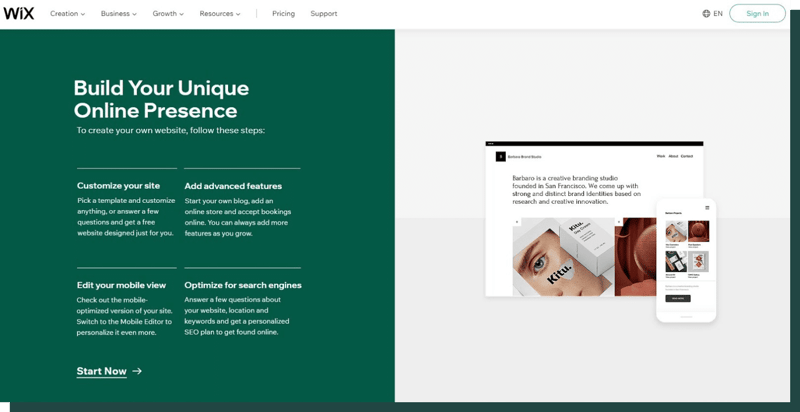
Wix is a bit smaller in scale than Shopify and BigCommerce but offers plenty of comparable features at a more flexible price point. Wix is one of the easiest and more pleasant platforms to set up, with tons of amazing themes and templates to choose from. Like Shopify, Wix has its own app store, where owners can browse compatible plugins to enhance their website. As a small-scale, easy-to-use, cost-effective platform, Wix is a great choice for all digital or service-based businesses.
Pros:
- Excellent, customizable designs
- Wix app-store for easy plugins
- Flexible pricing
Cons:
- Not as robust as Shopify or BigCommerce
👉 Check out our deeper dive into Wix Pros and Cons.
Squarespace: Best for Individual Creatives
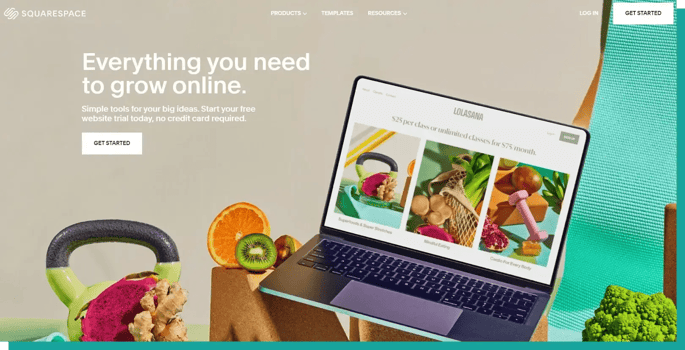
Squarespace is more known as an excellent platform for sharing an artistic portfolio rather than hosting your business operation. And that remains true: Squarespace is not an ideal platform for small business owners. However, Squarespace excels as an ecommerce platform for individual creatives offering digital products or services.
A visuals-first platform, it's easy to create a beautiful, aesthetically pleasing site using Squarespace. With great designs, templates, and customization options, Squarespace sites stand out because of their excellent visuals and design. And for individuals setting up a simple, small ecommerce operation, Squarespace provides plenty, with support for sales, payment processing, services, subscriptions, and appointment scheduling.
But, if you are a business owner, or plan on scaling past the individual level, Squarespace starts showing its limitations rather quickly.
Pros:
- Create customizable, visually-striking designs
- Robust SEO
- Great for individual creatives or freelancers
Cons:
- Hard to scale
- No app store
Etsy: Best for Handmade Sellers
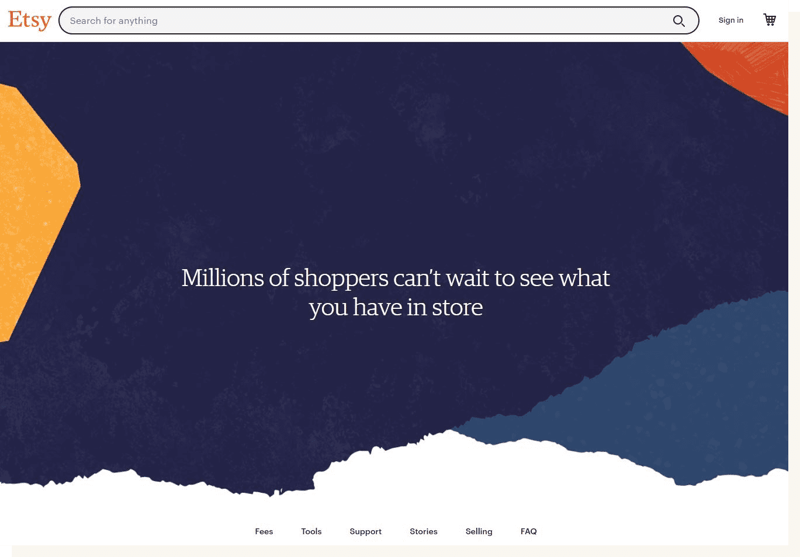
Etsy is more akin to a storefront than a personalizable eCommerce platform. Best known as the home for artists selling handcrafted goods, Etsy is perfect for people who simply want to sell their small-batch or individual products, without all the hassle of creating a website or business. Instead of making an entire site from scratch, users make an account, personalize a store page with products, and sell through Etsy’s platform. Etsy handles the rest. It’s a great solution for artists looking to sell their physical goods, but lacks the features to drive a small to medium sized business.
Pros:
- Turn key experience: no setup or fees
- Vibrant artistic community
Cons:
- Not robust enough for serious businesses
- Lacks scalability and customization
Webflow: Best for No-Code Enthusiasts
Webflow is one of the fastest-growing website builders and trusted by over 200,000 users. It's a relative wildcard for ecommerce but certainly one of the most cost-effective. We like that Webflow now has a robust app store with plenty of third-party apps suited for marketing and payments. Webflow can build some stunning websites, which should be no different if you're planning on setting up an online shop.
Pros:
- Passionate design community
- Plenty of Webflow agencies specializing in bringing your ideas to life
- Futuristic platform that's going to scale aggressively
Cons:
- Not suited for large enterprises
- Still new to ecommerce capabilities
👉 Check out our deeper dive into Webflow's Pros and Cons.
The Perfect Plan for You
Ultimately, the best eCommerce platform is the one that’s best for you. Hopefully we’ve given you a good idea of what to consider, and what options are out there. Go forth, and build the site of your dreams on an eCommerce platform that matches your vision.

Paige Harris
Paige is the growth marketing lead at Enzuzo and host of The Living Lab podcast, providing insightful articles in the privacy space.
